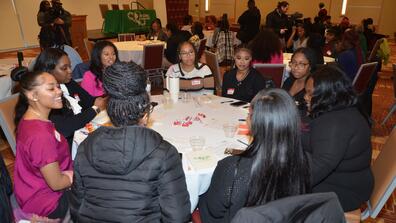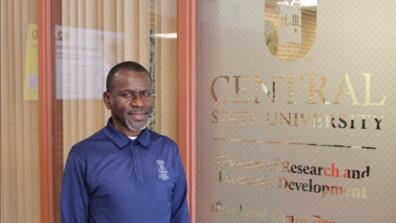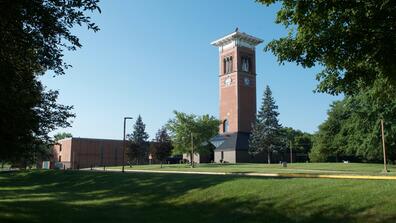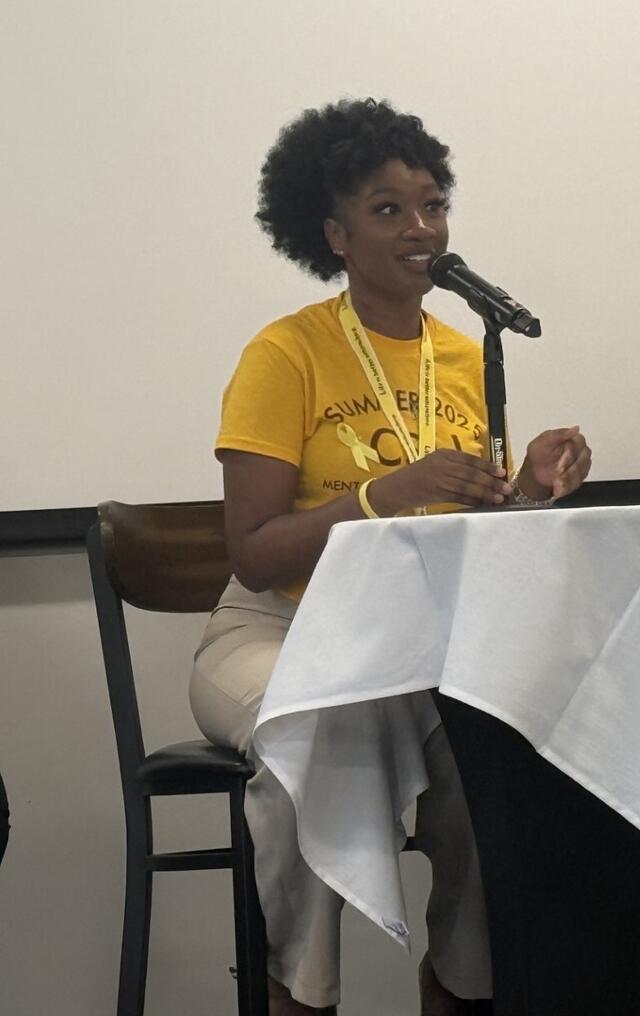
Uniting generations for suicide prevention in Black communities
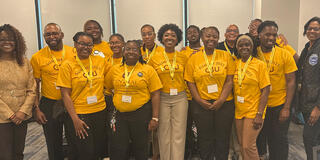
Editor’s note: This is Part II in a series highlighting Minority Mental Health Month.
At the Suicide Prevention in the Black Community Summit held on June 27, a powerful intergenerational panel called “Table Talk: Listen, Learn, and Lead” modeled vulnerability, courage, and healing in real time. With voices from Central State University students, mental health advocates, and seasoned professionals, the conversation was a living example of what it means to “hold space” in a community of care.
Moderated by Dr. Rhyanné McDade, public health educator and president of Apple of His Eye Inc., the panel created what she called a “sacred conversation.” It featured students and alums from Central State University — including Alexis Luckie, Myles Calhoun, LaMont Calhoun, and Robby Harris — alongside seasoned mental health leaders like Dr. Sonia Hunt, Director of Counseling Services at Central State, and George Hicks III of ArkBuilders and NAMI Franklin County.
When real talk becomes real healing

For Luckie, a psychology major at Central State, mental health became deeply personal after the loss of her father in 2020. “I realized mental health is really, really important. It gets really scary for people who don’t know how to deal with it,” she shared.
That moment of grief sparked her commitment to becoming a mental health advocate.
Panelists opened up about personal experiences with depression, body dysmorphia, peer pressure, and social isolation, describing the emotional toll of trying to fit impossible social standards — especially those amplified by social media.
“We’re held to these ridiculously high standards,” Luckie said, noting how the pressure to always “look the part” distracts from cultivating authenticity and emotional health.
Yet even amid those struggles, what emerged was a spirit of resilience.
“Healing looks like being willing to be uncomfortable and grow,” said Harris, a 2025 graduate. “If you’re stuck in that environment, marinating in that mindset, you’re not progressing.”
What young adults need to feel heard
Throughout the panel, students and alumni emphasized what it feels like when they are truly seen and heard — and when they are not.
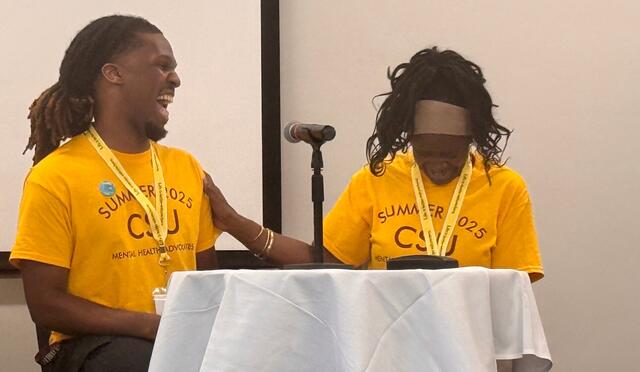
“When I ask for help, I want to feel like we’re building toward a solution together,” said Myles Calhoun. “Not just being told what I should need.”
Harris echoed that sentiment: “I’ve been told what my needs are instead of being listened to. I know what I need help with. I need you to hear me.”
Dr. Hunt, who has spent decades helping students navigate mental and emotional challenges, summed up the generational disconnect:
“We underestimate their potential. But this isn’t the future generation — they are the Now Generation.”
Breaking the silence, dismantling the stigma
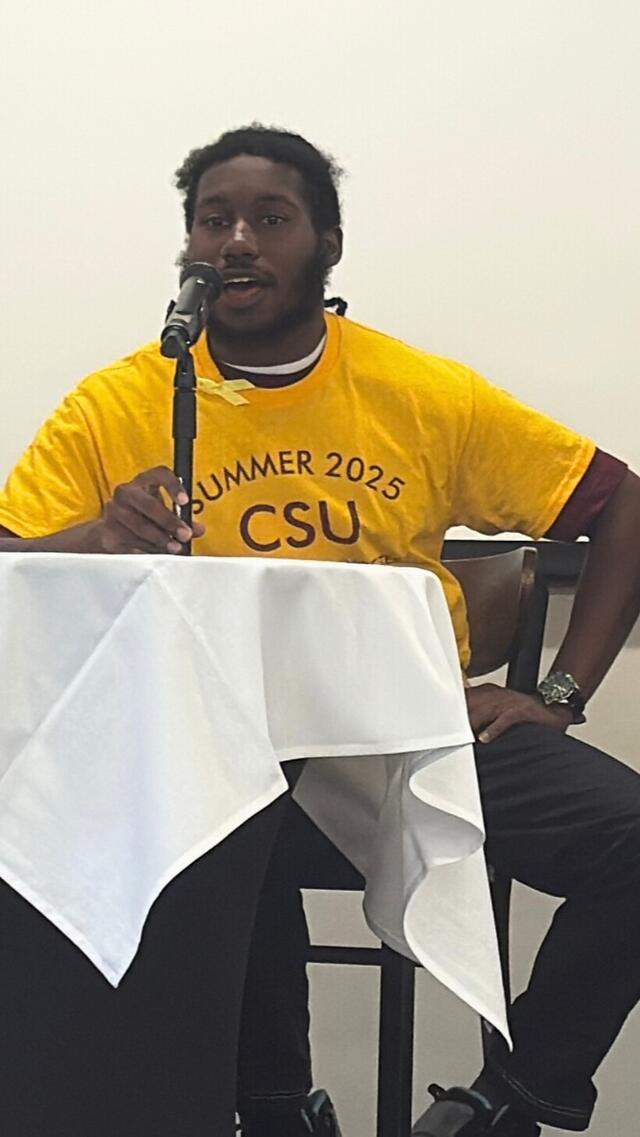
Addressing suicide in the Black community requires unlearning deeply ingrained taboos and language. As LaMont Calhoun noted during the panel, even common phrases like “committed suicide” can cause harm. “We learned it’s better to say ‘died by suicide’—because words matter.”
Dr. Hunt added that society arbitrarily decides which illnesses carry stigma.
“There’s no stigma against high blood pressure or diabetes. But mental illness? We stigmatize that, and we must change the conversation.”
Panelists traced this silence back through generations of inherited trauma. “Our ancestors didn’t have time to process emotions. They were in survival mode,” Harris said.
“But our problems are different now. They are just as valid — and we deserve to feel.”
Building bridges between generations
One of the most moving aspects of the panel was the mutual respect between students and adult allies. “This panel has restored my faith,” Dr. McDade said. “The emotional intelligence these students showed today — I didn’t have that language at their age.”
The intergenerational exchange wasn’t about preaching — it was about listening. Dr. Hunt spoke of a recent Jazz Jam session on campus, where students, alumni, and community members came together to sing and connect. “That was healing. That was community,” she said.
“What gives me hope is what's up here on this day, and the fact that it is not magic. It can happen in any environment, and it's not a secret that our young people grow up because they have caring adults who empower them."
Students expressed their commitment to being part of the solution — from volunteering in underserved communities, to pursuing therapy, to simply showing up and being present.
“I want to help my community heal,” Luckie said. “I’m from Dayton. We could be so much more. We have so much potential.”
A blueprint for hope
What unfolded at the summit was a blueprint for how communities can heal, together. The panelists didn’t claim to have all the answers. Instead, they modeled what it looks like to ask the hard questions out loud, with honesty and heart.
As Dr. Hunt said, “Don’t write this generation off. They are not broken. They are the answer.”
If this conversation taught attendees anything, it’s that suicide prevention begins with presence — with sitting at the table, listening without judgment, and believing that healing is possible. Not just someday, but now.
Participants
LaMont Calhoun is a thoughtful young man who values listening, growth, and self-improvement. Along this journey, LaMont has both smiled and cried and is grateful to have experienced the fearless depth of emotion that comes with embracing both the highs and lows. His aspirations include improving his health and encouraging others, both men and women, as well as himself, that self-doubt can be overcome through intentional rest, mindfulness, and a dedicated commitment to personal well-being.
Myles Calhoun is a proud legacy student at Central State University from Cincinnati, Ohio. Currently a junior majoring in communications, he serves as the liaison for CSU’s Theatre Arts Program. With a passion for storytelling and performance, he aspires to build a successful career in the entertainment industry. He recently collaborated with fellow writers on his first production at CSU, where he had the unique opportunity to work alongside his acting coach, Felicia Chapelle – renowned actress and sister of comedian Dave Chappelle.
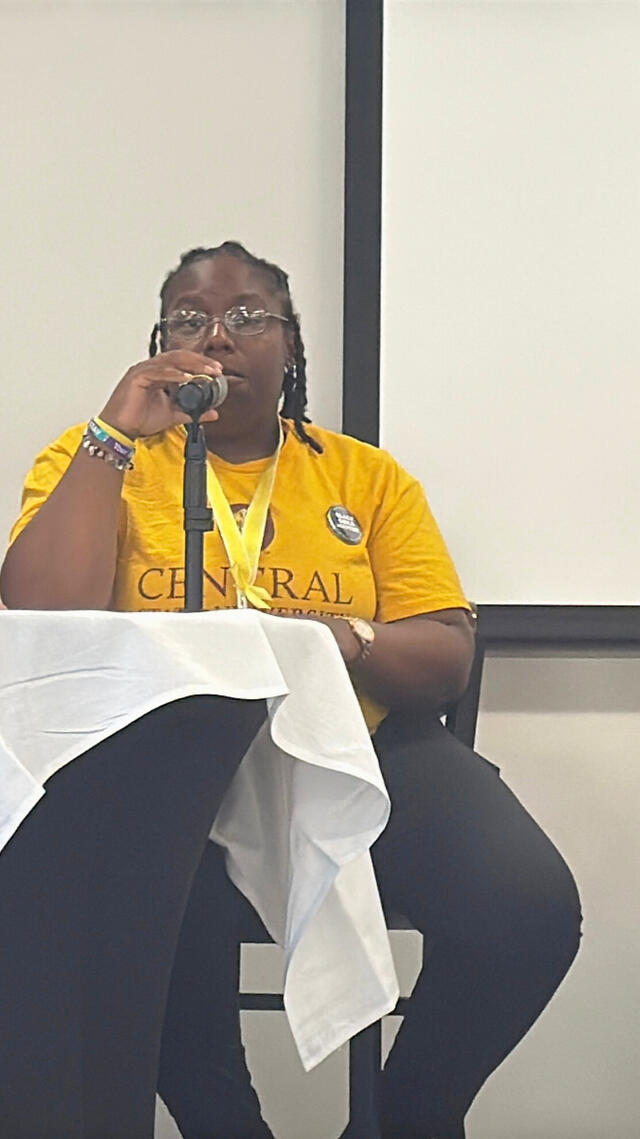
Robby Harris graduated from Central State University in May with a 3.39 GPA. She was a member of the marching band, concert band, and the President’s Own Big Band. She plans to pursue her Master of Social Work at Kennesaw State University and hopes to become a social worker for the VA or the Fair Force Civilian Service.
George A. Hicks III is President and Executive Director of ArkBuilders Inc. George has over 35 years of program development experience. He coordinates programs both in schools and community populations. H also facilitates a variety of presentations and trainings. George has extensive experience working with urban youth in the Columbus, Ohio area. He is an Ohio adult ally for youth-led programs.
George is currently partnered with NAMI Franklin County, Central State University, Bantu Hope Foundation, the City of Columbus Recreation and Parks, Maryhaven Gambling Intervention Program, Columbus Health Department, Asian American Community Services, Lead the Way Learning Academy, Capital University, CI Art Institute, and Be the Village OHIO. ArkBuilders staff has successfully overseen $5.5 million in grants in collaboration with the above agencies.
Dr. Sonia A. Hunt serves as the Director of Counseling Services at Central State University, where her leadership fosters a supportive and inclusive campus environment. Sonia provides essential mental and behavioral health interventions to students while championing initiatives to create a culture of care. Her efforts include training programs in suicide prevention and trauma-informed care, reducing the stigma surrounding mental health. She also works to prevent sexual violence on campus, collaborating with students, staff, and external organizations.
Sonia’s leadership empowers students to approach their mental health with intention, equipping them with tools to thrive academically and personally. Her affiliations and recognitions include: Central State University Social Work Advisory Board member, Wright State University Social Work Program Supervisor of the Year recipient, Wal-Mart Teacher of the Year Recipient, Ohio Department of Education Career-Based Intervention Partnership Award recipient, Strategic Ohio Council of Higher Education Excellence Award recipient, Eta Phi Beta Heart of Gold recipient, and past Advisory Board member for Cedarville University Social Work Program.
Sonia earned her Bachelor of Science in Sociology from Central State University, a Master of Education in Counseling from the University of Dayton, and a Doctorate in Professional Counseling from Mississippi College.
Alexis Luckie is a sophomore at Central State University in Wilberforce, Ohio, pursuing a Bachelor of Science in Psychology. With a commendable 3.48 GPA, Alexis actively participates in campus organizations such as the NAACP College Chapter and the Praise in Motion dance ministry, reflecting a commitment to civic engagement and creative expression.
Passionate about mental health advocacy, Alexis aspires to further her education by obtaining a master’s degree and potentially a doctorate in psychology. Her ultimate goal is to serve as a mental health specialist, focusing on supporting young African American students within her community.
Through dedication and continued education, Alexis aims to address mental health disparities and promote well-being among youth.
Dr. Rhyanné McDade was born and raised in Lincoln Heights, Ohio, the first African American self-governing community north of the Mason-Dixon Line. She earned her doctoral degree in Public Health Education from the University of Cincinnati in 2016. Her research focuses on minority health disparities, particularly psychosocial factors linked to risky behavior in youth and young adults, including teen pregnancy, bullying, substance use, and mental health. Dr. McDade is an Assistant Professor of Practice at Northern Kentucky University in the School of Kinesiology, Counseling, and Rehabilitative Sciences. She also serves as president and co-founder of Apple of His Eye Inc., a faith-based nonprofit in Cincinnati that supports individuals and families with serious mental health conditions.
If you or someone you know is experiencing a mental health crisis, help is available. Call or text the 988 Suicide & Crisis Lifeline for free, confidential support from trained counselors 24/7.
Top photo: Central State University students, alums, faculty, and community partners came together to hold space for discussions about mental health in Black communities.
